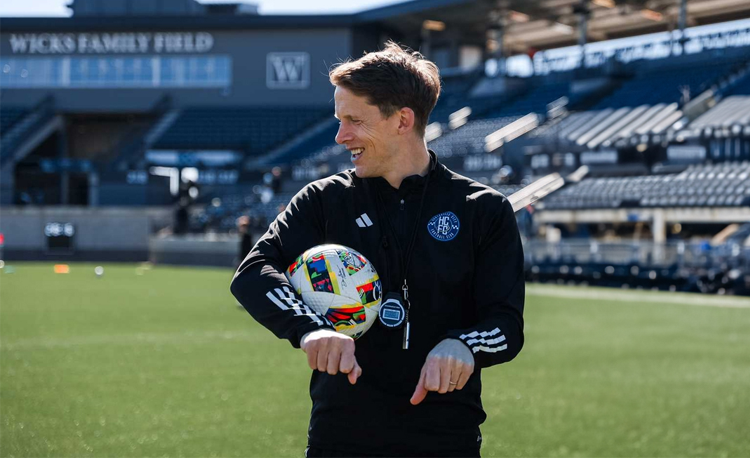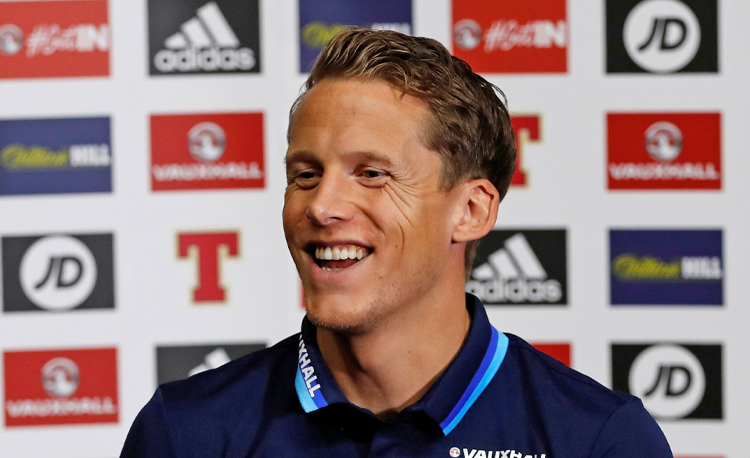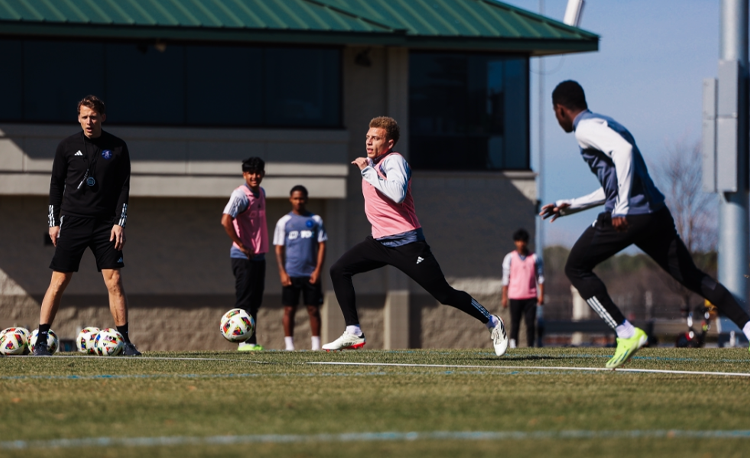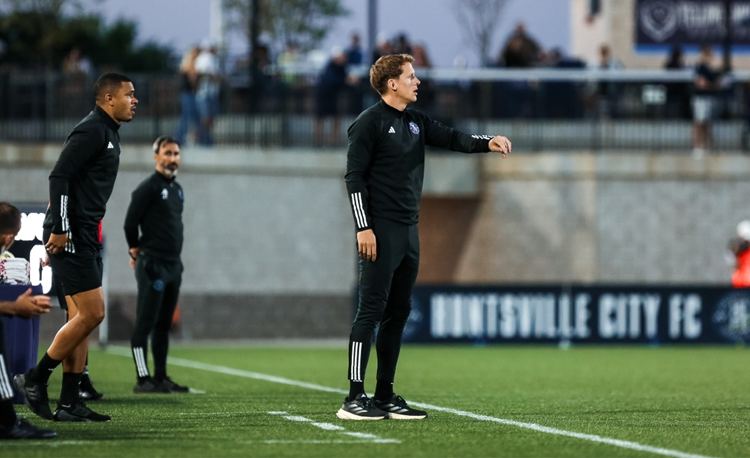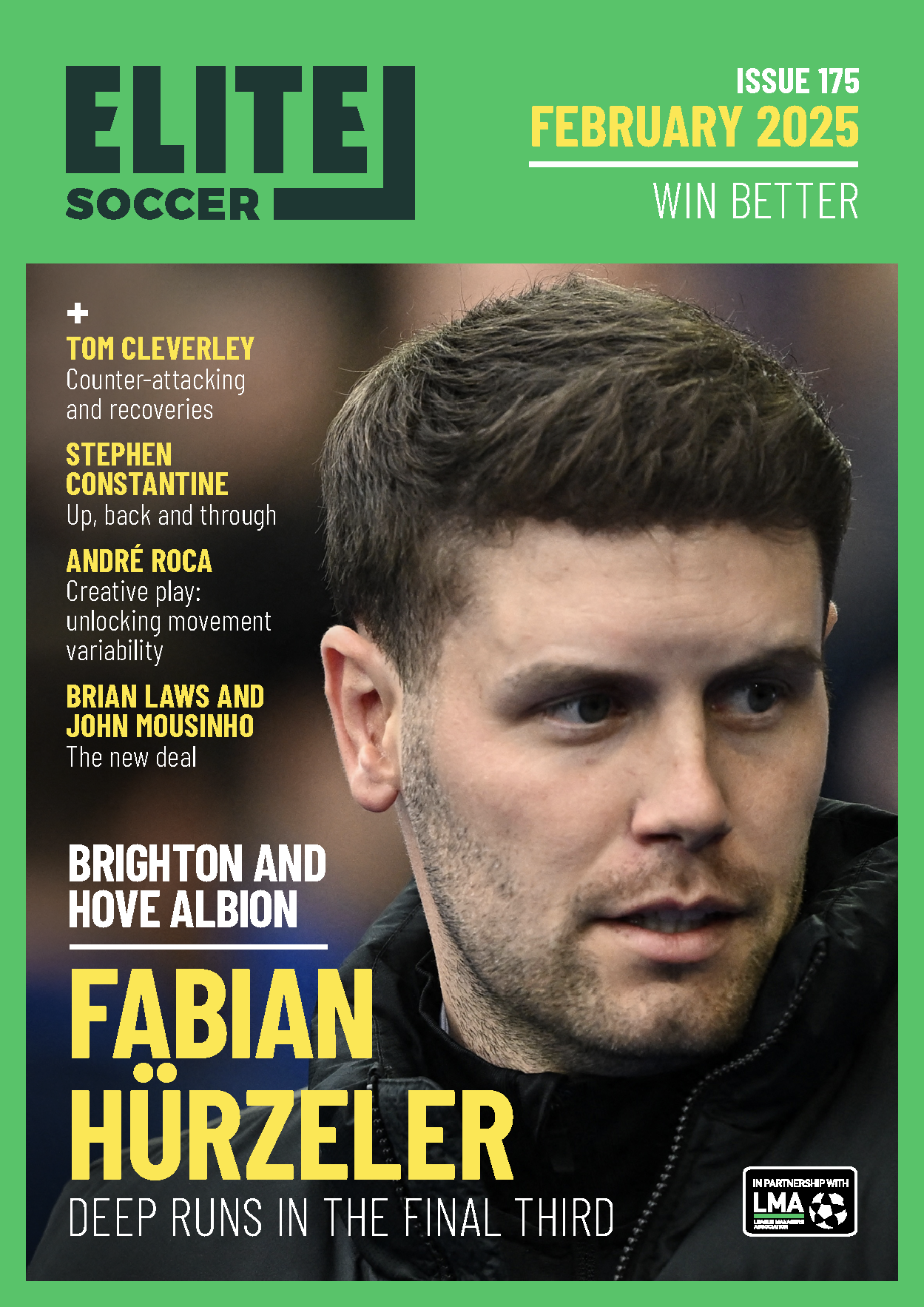You are viewing 1 of your 1 free articles
Christophe Berra: From player to coach
As a player, Christophe Berra represented Scotland 41 times and spent his domestic career in Scotland and England, notably captaining his hometown club Heart of Midlothian. Since retiring in 2022, the former centre-back has ventured into coaching and has so far had spells with Raith Rovers, Livingston, Scotland under-21s and at the helm of Huntsville City FC in Alabama. He offered his insights from playing and coaching to Steph Fairbairn.
Berra on the transition from playing to coaching
If I could change anything, I would’ve started coaching earlier. Even when I was at Ipswich, I could have been coaching the youth teams or helping. I didn’t, because you’re in a bubble at that time of your life. Things have moved on now, there’s more social media, more interaction to get players into coaching.
I started thinking about being a coach at the start of my 30s. You’re training, you’re wondering why you’re doing certain things in a session. Then, obviously, there’s the influence of social media and football in general; even just Sky Sports with the likes of Jamie Carragher and Gary Neville analysing games, it can really open your eyes to a different side of the game.
When the time to transition into coaching came, it was enjoyable. I started at Livingston, in Scotland. The manager, David Martindale, was good there. I learned a lot.
Berra on how he sees the game of soccer
One thing that I’ve realised from being in America and over the course of doing my Pro Licence is you can be there forever thinking about your game model because you can chop and change and second-guess yourself. It’s something that’s always evolving. You’ll have your key principles, but your sub-principles may change over time.
When you’re working at a higher level, I think recruitment is key. For example, if you want to be a high-pressing team and play a high line, you need dynamic, energetic, fit players who are also fast, who can deal with balls in behind, who can press from the front.
Or, if you want to sit deep and counter-attack, again, you need fast players who can transition quickly, but you also need defenders and players who can defend their box well and win headers and tackles.
In terms of how I see the game, I’d like my teams to be dynamic and strong-footed. I would like them to be like I was a defender – attacking with a high press – but I’m not naive to think I can always do that. So I’m happy to be in a mid-block and wait for the moment to win the ball back and transition quickly if we can.
Obviously you want to build from the back, but I’ve watched many games when teams persist at playing out from the back and they can’t get there. Play what you see. If a team are really over-committing, high up the pitch and pressing player-to-player, there’s clearly space in behind or in front or in between their defensive line and their midfield lines that you can target.
It’s about giving the freedom to players that, yes, you have your principles – you want to create overloads, switch play, make runs in behind and so on – but you need to be able to adapt to what the game is giving you.
I think you can still have your principles, but you need to be able to adapt to what the game is giving you. At the elite level, a lot of teams won’t change the way they play. Nine times out of ten with Manchester City or Arsenal, for example, you know what they’re going to do and they’re going to keep on doing it.
But I think the lower down you go, teams will chop and change within a game – whether that’s changing formation or deciding to be more direct – so it’s a bit more difficult. So you can analyse games in the build-up to them, but on matchday, it won’t necessarily be like that; the game’s changing every split second.
Berra on creating the right environment at Huntsville
At Huntsville there were about eight full-time staff. The environment starts with the staff. I was always a believer that I was not going to be one of these managers or coaches who just does everything themselves.
Yes, I oversaw everything, but I gave people the responsibility to go and do their own stuff: the coaches to take the sessions and have their input, those who are young and learning responsibility to go and look at videos and teams and produce video sessions.
If you’re in an environment where you’re doing everything yourself, it’s not enjoyable. You need to trust people, you need to give people responsibility. They’re there for a reason. They’re good at their jobs.
In terms of the players, I was never too harsh on the guys. I was always very approachable, had an open-door policy, was quite easy going. Of course, I had demands when it came to training and matches, though.
I believe in giving players freedom within their role in the team. If you’re playing a positional kind of game, the players need to respect what their role within the team is. However, there is a time when they need to go and find the ball and make a little bit of magic as well. You can’t just make them be robots.
On the touchline I was very enthusiastic: encouraging them to close down and press when they need to, encouraging them to get back into shape and position. On reflection, there are times when I got a little bit too carried away, but I think any manager is the same. You look at the top-level managers, even Pep Guardiola at times, they all get carried away.
Berra on different approaches to matchday preparation
It’s fast-paced and sometimes football can be over-complicated.
In this day and age, a lot of players like to get coached and see that what they are working on in training contributes to the game. In the past, I’ve been in involved in environments where it might not have been like that.
That doesn’t mean you’re a success or not a success. There are a lot of managers who will leave no stone unturned and cover every aspect but still get beaten, whereas some managers just won’t do that and the training will be basic, it’ll just be fun and they win games.
Related Files
Berra on development and winning
Taking Huntsville FC as an example, at that level, there’s the question about development and winning when you’re on a development team. For me, yes, you need to develop individuals within the team environment. But winning is also part of development.
I think people sometimes get too stuck on it being about development. It clearly is, but you need to develop winners as well. You need players that are willing to compete in games because if you don’t have that competitive edge in games or within an individual player, it’s hard to get.
At any level, if you can’t compete and you’re not competitive, it’s going to be a hard road. You’ll be fortunate to make a career out of the game, unless you’re exceptional.
Berra on whether elite coaches need to have played the game at the top level
I think it’s naive to think that someone who’s never played a game [at the highest level] can’t coach. Everyone’s got their place. I don’t think you can really make a judgement on a coach until you see them coaching and doing their thing.
There are a lot of managers who have never played the game who are exceptional. But they’ll be surrounded by assistants and coaches who probably have played the game. Everyone’s got their strengths and weaknesses and will see things differently. It’s about getting people around you who can help with your weaknesses.
Of course there’s a place for you having lived and felt it as well. You’ve been in that situation. By the same token, some players have been in it and, at times, get stuck in that: ‘This is how we’ve done it. This is what we’re going to do.’ But you need to adapt. You need to move on. Football evolves. Everything’s different. It’s a new generation of players.
Editor's Picks
Deep runs in the final third
Using the goalkeeper in build-up play
Pressing principles
Intensive boxes drill with goals
Penetrating the final third
Creating and finishing
My philosophy
Pressing initiation
Compact team movement
Coaches' Testimonials

Alan Pardew

Arsène Wenger

Brendan Rodgers

Carlos Carvalhal

José Mourinho

Jürgen Klopp

Pep Guardiola

Roy Hodgson

Sir Alex Ferguson

Steven Gerrard
Coaches' Testimonials

Gerald Kearney, Downtown Las Vegas Soccer Club

Paul Butler, Florida, USA

Rick Shields, Springboro, USA

Tony Green, Pierrefonds Titans, Quebec, Canada
Join the world's leading coaches and managers and discover for yourself one of the best kept secrets in coaching. No other training tool on the planet is written or read by the calibre of names you’ll find in Elite Soccer.
In a recent survey 92% of subscribers said Elite Soccer makes them more confident, 89% said it makes them a more effective coach and 91% said it makes them more inspired.
Get Monthly Inspiration
All the latest techniques and approaches
Since 2010 Elite Soccer has given subscribers exclusive insight into the training ground practices of the world’s best coaches. Published in partnership with the League Managers Association we have unparalleled access to the leading lights in the English leagues, as well as a host of international managers.
Elite Soccer exclusively features sessions written by the coaches themselves. There are no observed sessions and no sessions “in the style of”, just first-hand advice delivered direct to you from the coach.

